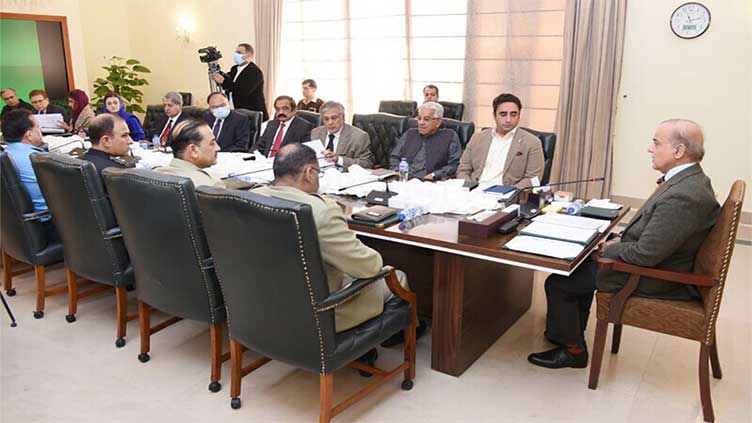The leaders of Pakistan convened to discuss how to respond to India’s aggression.

On Thursday, a crucial National Security Committee (NSC) meeting will take place here to discuss how best to react to India’s activities in the wake of the Pahalgam incident.
Suspected militants opened fire on tourists in Pahalgam, in the Indian state of Jammu & Kashmir, killing 27 and wounding 17. According to reports, this is the worst attack of its kind to hit the nation in almost 20 years.
India and Pakistan engaged in a blame game after the horrific occurrence, accusing one another of planning the strike with hidden agendas.
India announced the suspension of the Indus Waters Treaty with Pakistan, the closing of the Attari checkpoint, and other measures after a cabinet meeting on Wednesday that was presided over by Indian Prime Minister Narendra Modi.
Later, in order to devise a practical reaction to India’s aggression, Pakistan’s leaders agreed to call a high-level meeting, which Prime Minister Shehbaz Sharif would chair.
India’s careless actions following what Pakistan claims is Pahalgam’s false flag operation would be discussed during the conference.
The internal and external circumstances that have emerged since the Pahalgam event will be discussed by senior military and civic leadership. Additionally, the senior leaders will address India’s reckless and rash decision, which has been compared to “water aggression.”
A “session of the National Security Committee will be held under the chair of Prime Minister Shehbaz Sharif,” according to a statement released by Defense Minister Khawaja Asif on Wednesday.
Decisions would be made to provide “an appropriate response to the Indian steps,” he said.
The defense minister added in a different statement that Pakistan denounced terrorism everywhere it happened.
At a private news channel, Asif stated, “India’s accusation against Pakistan following the Pahalgam incident is inappropriate.” He went on to say that Pakistan was the nation most impacted by terrorism and had been for many years.
He questioned how, as a victim of the epidemic, Pakistan could turn to terrorism.
“There should be no ambiguity that we strongly condemn terrorism,” the defence minister said. He said the possibility of a “false flag operation” could not be ruled out.
THE REACTION OF INDIA TO MASSACRE
The Indian cabinet announced the suspension of the Indus Waters Treaty with Pakistan and the closure of the Attari check post in the aftermath of the attack.
At a press conference, the Indian Ministry of External Affairs also declared the cancellation of all visas issued to Pakistani nationals, instructing those currently in India to leave the country within 48 hours.
India has also suspended visas issued under the SAARC framework for Pakistani citizens.
A spokesperson said the Indian nationals residing in Pakistan must return via the Attari border crossing by May 1.
India has declared all military, naval, and air advisers in the Pakistani High Commission as “persona non grata” and recalled its own defence attaché from Pakistan.
Seven days have been provided to all employees of Pakistan’s High Commission in India to return to Pakistan. Additionally, by May 1, India plans to reduce the number of its diplomatic personnel in Pakistan from 55 to 30.
PAKISTAN’S CONCERNS
Pakistan expressed deep concern over the attack in the Pahalgam area of the occupied Jammu and Kashmir (IIOJK) which claimed the lives of 27 people and left 17 injured.
In a statement released on Wednesday, Foreign Office spokeswoman Shafqat Ali Khan said that Pakistan was “saddened by the incident and expressed sympathy with the families of the deceased.”
“We wish the injured a speedy recovery and offer our condolences to the loved ones of the deceased,” he said.
The spokesperson added that “we are concerned at the loss of tourists’ lives in an attack in Anantnag district of Indian Illegally Occupied Jammu and Kashmir.”
ANALYSTS BERATE INDIA FOR SPEWING HATE
Defence analysts and leaders in Pakistan said India kept alive its tradition of levelling baseless allegations against Pakistan.
They said its propaganda machinery started churning out accusations of Islamabad’s involvement in the occupied Kashmir incident.
The Indian media, they said, had been using such attacks without evidence to fuel anti-Pakistan sentiments. In actuality, these charges are frequently planned and intended to incite animosity toward Pakistan.
India constantly attempts to link terrorism to Muslims and Pakistan, despite the fact that terrorism has no religion.
Within half an hour of the Pahalgam attack, Indian social media accounts began tweeting with the hashtag #PakSponsoredTerror. Moreover, BJP leaders JP Nadda and Amit Shah posted tweets about the incident within half an hour after the incident, sources said.
WHAT HAPPENED IN PAHALGAM?
As many as 27 people were killed and 17 were injured when suspected militants opened fire at tourists in Pahalgam.
The attack happened Tuesday in Pahalgam, a well-known tourist destination in the picturesque Muslim-majority region that has experienced a rise in mass travel in recent years as insurgent activity has decreased.
According to officials, 25 Indians and one Nepalese national were among the dead of the incident, which took place in an off-road meadow.
Since the 2008 Mumbai shootings, which claimed over 160 lives, it was India’s bloodiest attack on civilians.
In protest of the assault on visitors, whose growing numbers have boosted the local economy, more than a dozen local organizations demanded a closure in the federal territory on Wednesday.
In protest, many schools likewise called off classes for the day.
Airlines were operating extra flights from Srinagar, the summer capital of the territory, as visitors were rushing out of the region, officials said.